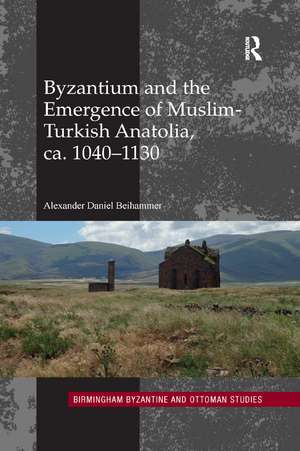Byzantium and the Emergence of Muslim-Turkish Anatolia, ca. 1040-1130: Birmingham Byzantine and Ottoman Studies
Autor Alexander Daniel Beihammeren Limba Engleză Paperback – 12 dec 2019
| Toate formatele și edițiile | Preț | Express |
|---|---|---|
| Paperback (1) | 389.38 lei 6-8 săpt. | |
| Taylor & Francis – 12 dec 2019 | 389.38 lei 6-8 săpt. | |
| Hardback (1) | 1010.53 lei 6-8 săpt. | |
| Taylor & Francis – 27 feb 2017 | 1010.53 lei 6-8 săpt. |
Din seria Birmingham Byzantine and Ottoman Studies
-
 Preț: 310.65 lei
Preț: 310.65 lei -
 Preț: 389.66 lei
Preț: 389.66 lei -
 Preț: 315.40 lei
Preț: 315.40 lei -
 Preț: 397.38 lei
Preț: 397.38 lei - 17%
 Preț: 259.98 lei
Preț: 259.98 lei -
 Preț: 399.29 lei
Preț: 399.29 lei - 15%
 Preț: 242.74 lei
Preț: 242.74 lei - 18%
 Preț: 1009.91 lei
Preț: 1009.91 lei -
 Preț: 373.43 lei
Preț: 373.43 lei - 18%
 Preț: 998.21 lei
Preț: 998.21 lei - 22%
 Preț: 328.20 lei
Preț: 328.20 lei -
 Preț: 389.38 lei
Preț: 389.38 lei - 22%
 Preț: 324.16 lei
Preț: 324.16 lei -
 Preț: 404.47 lei
Preț: 404.47 lei - 17%
 Preț: 256.87 lei
Preț: 256.87 lei - 22%
 Preț: 324.16 lei
Preț: 324.16 lei - 25%
 Preț: 776.84 lei
Preț: 776.84 lei - 25%
 Preț: 834.82 lei
Preț: 834.82 lei - 24%
 Preț: 766.00 lei
Preț: 766.00 lei -
 Preț: 387.91 lei
Preț: 387.91 lei -
 Preț: 311.41 lei
Preț: 311.41 lei -
 Preț: 469.34 lei
Preț: 469.34 lei -
 Preț: 389.66 lei
Preț: 389.66 lei - 17%
 Preț: 259.72 lei
Preț: 259.72 lei - 25%
 Preț: 771.95 lei
Preț: 771.95 lei -
 Preț: 405.83 lei
Preț: 405.83 lei - 18%
 Preț: 1062.31 lei
Preț: 1062.31 lei - 18%
 Preț: 1008.53 lei
Preț: 1008.53 lei - 26%
 Preț: 873.93 lei
Preț: 873.93 lei -
 Preț: 489.26 lei
Preț: 489.26 lei
Preț: 389.38 lei
Nou
Puncte Express: 584
Preț estimativ în valută:
74.53€ • 76.80$ • 62.92£
74.53€ • 76.80$ • 62.92£
Carte tipărită la comandă
Livrare economică 03-17 martie
Preluare comenzi: 021 569.72.76
Specificații
ISBN-13: 9780367884482
ISBN-10: 0367884488
Pagini: 460
Dimensiuni: 156 x 234 x 28 mm
Greutate: 0.45 kg
Ediția:1
Editura: Taylor & Francis
Colecția Routledge
Seria Birmingham Byzantine and Ottoman Studies
Locul publicării:Oxford, United Kingdom
ISBN-10: 0367884488
Pagini: 460
Dimensiuni: 156 x 234 x 28 mm
Greutate: 0.45 kg
Ediția:1
Editura: Taylor & Francis
Colecția Routledge
Seria Birmingham Byzantine and Ottoman Studies
Locul publicării:Oxford, United Kingdom
Public țintă
PostgraduateCuprins
List of Maps
Acknowledgments
Introduction: Conquests, Modern Nations, and Lost Fatherlands
Sources, Images, Perceptions
Part I First EncounterS in Byzantium’s Eastern Marches, ca. 1040-1071
1. The Eastern Provinces, Turkish Migrations, and the Seljuk Imperial Project
2. Byzantine-Seljuk Diplomacy and the First Turkish Footholds
3. Emperor Romanos IV and Sultan Alp Arslān, 1068-1071
Part II Decay of Imperial Authority and Regionalization of Power, 1071-1096
4. Sulaymān b. Qutlumush and the First Turkish Lordships in Syria
5. Revolts and Byzantine-Turkish Coalitions in Asia Minor, 1071-1081
6. Seljuk Rule between Centralization and Disintegration, 1086-1098
7. Turkish and Byzantine-Armenian Lordships in Asia Minor
Part III The Crusades and the Crystallization of Muslim Anatolia, 1096-ca.1130
8. Seljuk Reactions to the First Crusade
9. New Contact and Conflict Zones
Conclusions
Bibliography
Index
Acknowledgments
Introduction: Conquests, Modern Nations, and Lost Fatherlands
Sources, Images, Perceptions
Part I First EncounterS in Byzantium’s Eastern Marches, ca. 1040-1071
1. The Eastern Provinces, Turkish Migrations, and the Seljuk Imperial Project
2. Byzantine-Seljuk Diplomacy and the First Turkish Footholds
3. Emperor Romanos IV and Sultan Alp Arslān, 1068-1071
Part II Decay of Imperial Authority and Regionalization of Power, 1071-1096
4. Sulaymān b. Qutlumush and the First Turkish Lordships in Syria
5. Revolts and Byzantine-Turkish Coalitions in Asia Minor, 1071-1081
6. Seljuk Rule between Centralization and Disintegration, 1086-1098
7. Turkish and Byzantine-Armenian Lordships in Asia Minor
Part III The Crusades and the Crystallization of Muslim Anatolia, 1096-ca.1130
8. Seljuk Reactions to the First Crusade
9. New Contact and Conflict Zones
Conclusions
Bibliography
Index
Notă biografică
Alexander Daniel Beihammer received his PhD from the University of Vienna and is a member of the Institut für Österreichische Geschichtsforschung. From 2001 to 2015 he taught at the University of Cyprus and is currently Associate Professor of Byzantine History at the University of Notre Dame. He has published widely on Byzantine official documents, diplomacy, and cross-cultural communication between Byzantium and the Muslim world, as well as on Byzantine-Latin contacts and mutual perception in the crusader states and the Eastern Mediterranean.
Descriere
This book proposes a new interpretation of the transformation from Byzantine to Muslim-Turkish Anatolia. With the waning influence of Constantinople and Cairo, in Anatolia and the Muslim heartlands, local elites and regional powers came to the fore as holders of political authority and rivals in endless power struggles. Turkish warrior groups qu
